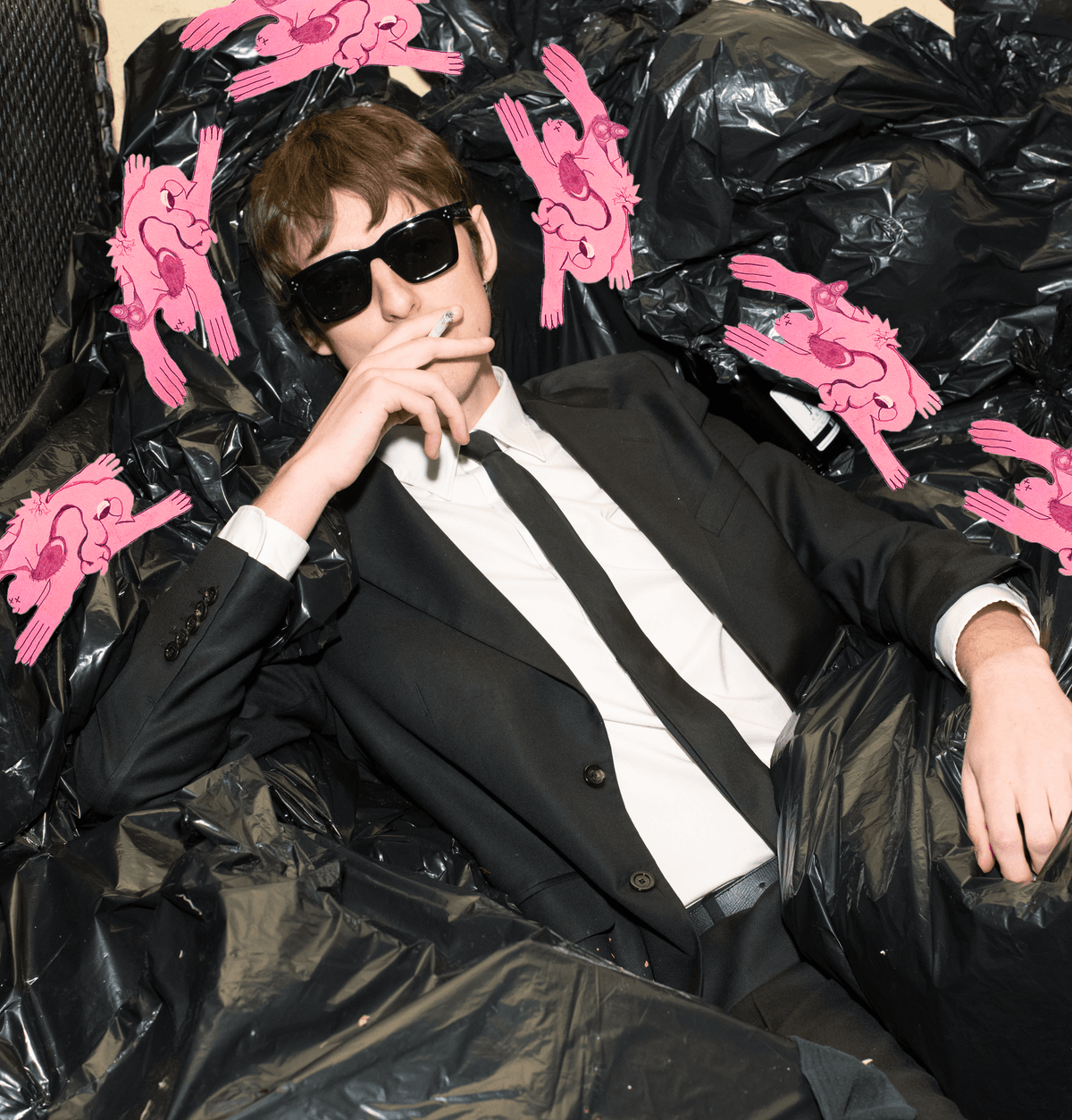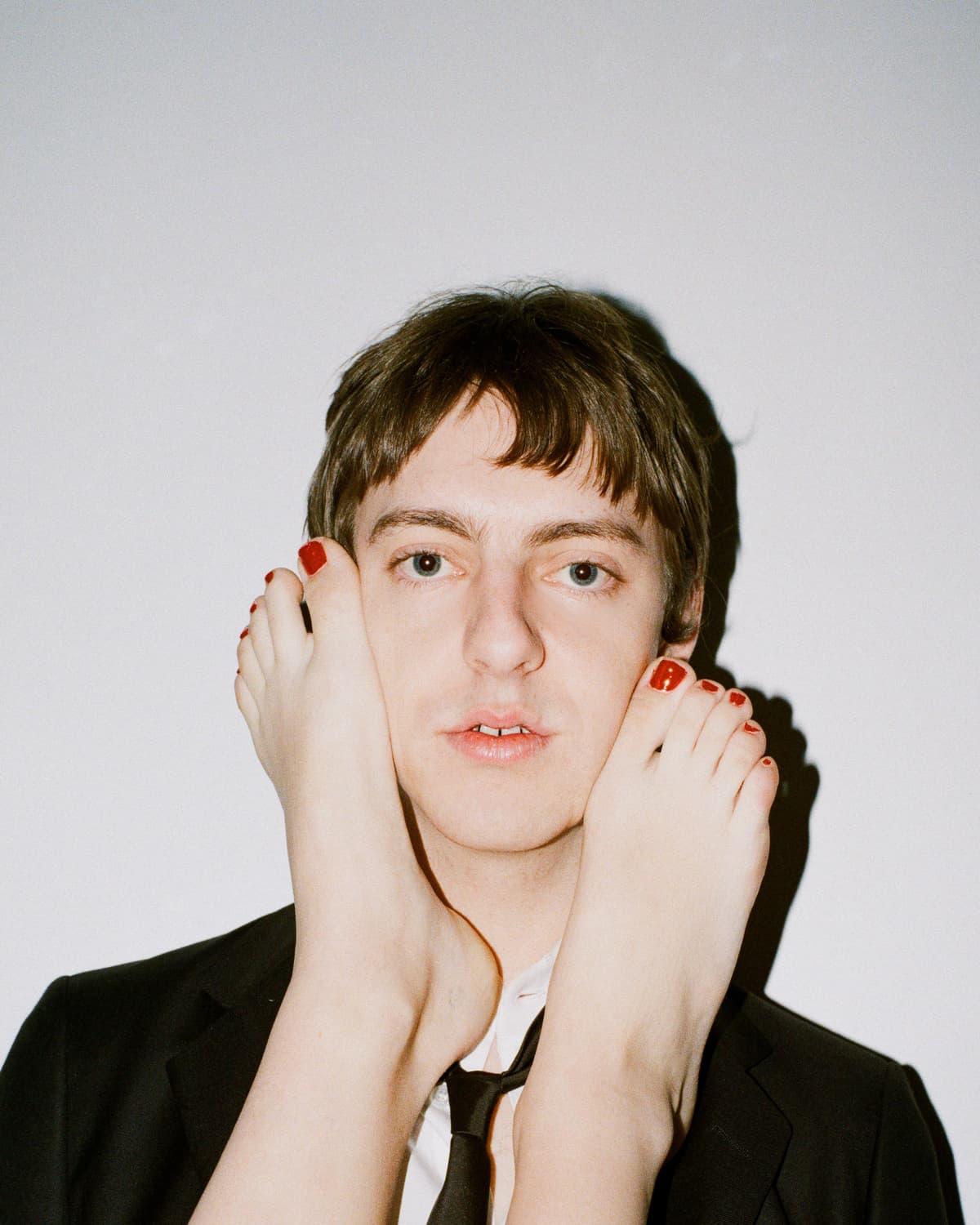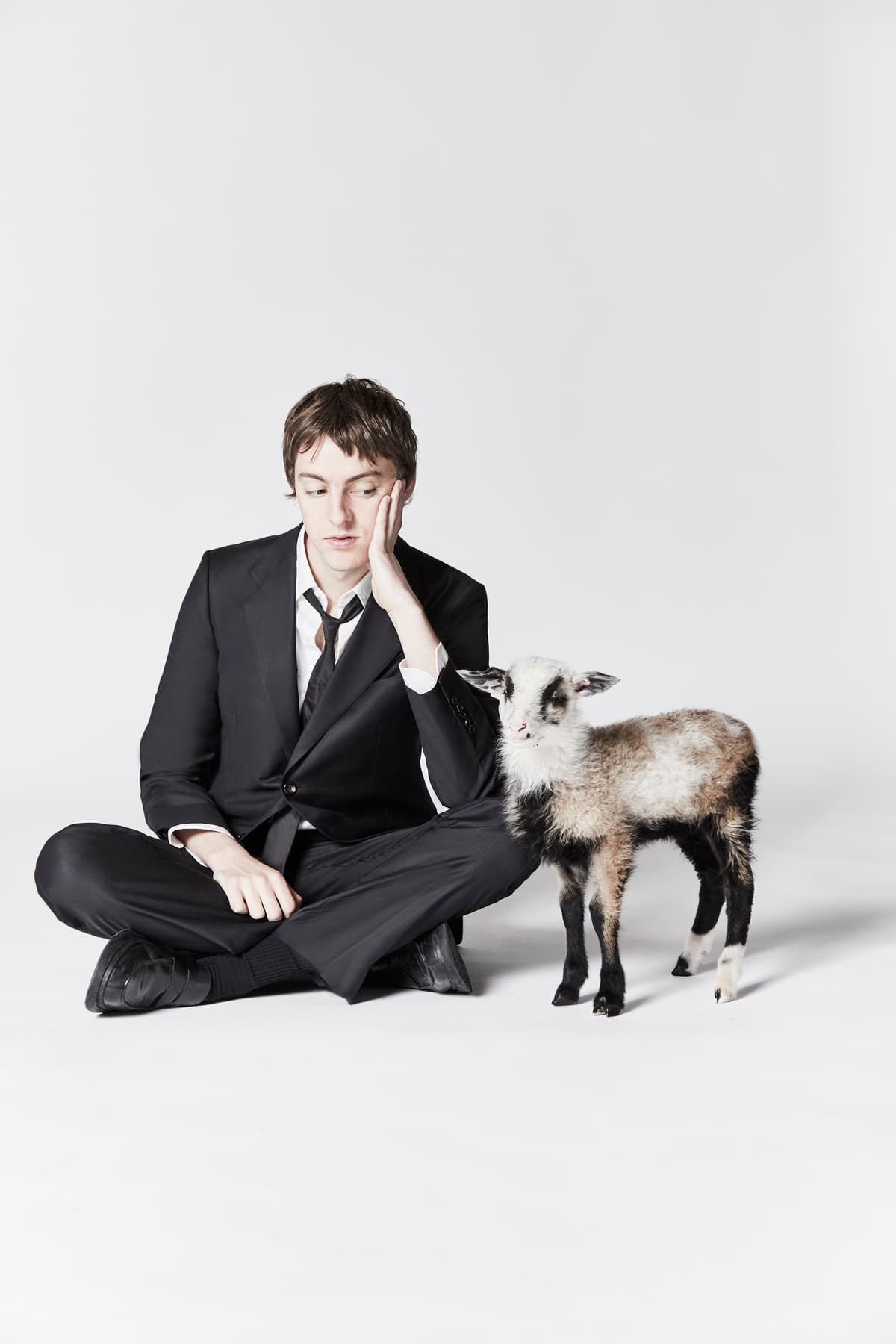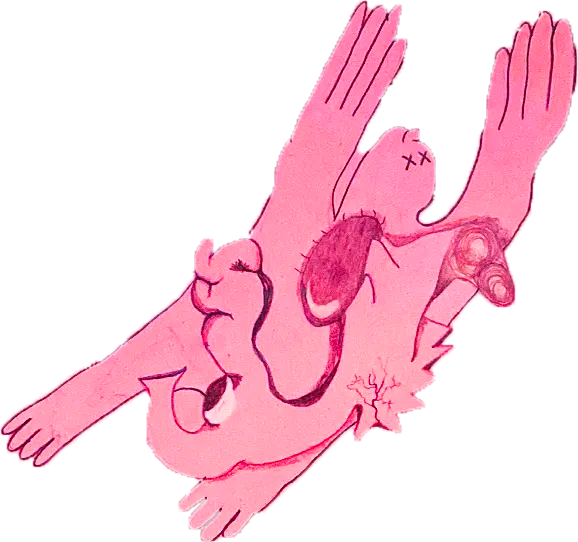HEDONISTIC, OPTIMISTIC, EXCITING
The Dare

“Music is having a renaissance in showmanship. A lot of music from the past 5, 10 years has been praised as authentic and down-to-earth for being understated and un-glamorous, but that’s starting to change–we’re seeing more larger than life personalities in music today.”
TESS POLLOK: You’re a pop musician–an indie pop musician–I don’t want to step on your toes here because music can be so complicated. You’re identified with indie sleaze, whatever that means; Pitchfork called you “unashamedly horny.” I can’t imagine any of our readers haven’t heard your single “Girls” yet. You also produced the track “Guess” for Charli XCX on her most recent album, brat. I’m a sucker for this, I love high BPM dance music; I like getting ready while listening to it, personally, but I’m not here to tell anyone what to do. What’s up next for you?
THE DARE: Well, I have a new album coming out probably around the end of this year and a single, “Perfume,” that came out on Friday.
POLLOK: What’s your new album about?
THE DARE: A lot of things… Nightlife, New York, relationships, sex, alcohol.
POLLOK: What were you thinking about sex and relationships when you made it? I’m trying to pinpoint if the album has, like, a monogamy-pilled and in love mindset, or if it’s more of a free-spirited “I love casual sex!” celebration.
THE DARE: I think, personally, I lean towards the former attitude, but I think the album follows a narrative arc of starting off really hedonistic, optimistic, and exciting before it crescendos in the middle–the second half is more of a comedown from the night out before. It’s more emotional and diaristic, more measured in its approach to the subjects.
POLLOK: Oh, perfect. It’s a hangover album. Like a night out and then a hangover.
THE DARE: Yeah, or whatever drug you do.

Image: Jared Kocka
POLLOK: How much partying do you think is appropriate?
THE DARE: For who?
POLLOK: Everyone. If you were a king and ruled the land, how much partying would people be allowed?
THE DARE: [Laughs] I rule the land? I don’t know, I’m not sure. I would say it really depends on the person. Unlimited partying is not good for you. But I think you should be allowed to party if you want to. This question is more complicated than it seems–is it having two drinks at a bar with friends or is it staying up until 6 a.m.?
POLLOK: You’re right, there’s a much more nuanced conversation to be had here about what constitutes partying. I apologize. Who are some of the artists you look up to the most? Who inspires you?
THE DARE: Beck is a huge inspiration to me. He’s funny, he’s colorful, he’s kind of sexy–even on Midnight Vultures he’s making this Prince-style psycho funk. Growing up, I loved of Montreal. But I don’t know–now there’s new records every day and there’s so much music to love. I think Lou Reed is maybe the greatest of all time.
I’m a huge fan of Stuart Murdoch from Belle and Sebastian and Jonathan Richman. I listen to a lot of punk acts from New York City and I feel a kinship to them, for sure, but that’s a parasocial, aspirational thing in its own way. There’s a punk attitude in their music that I aspire to with my sound. And I want to deal with things in my life that way, basically. I’m also thinking of Richard Hell and Television, just any number of late ‘70s New York punks who are obsessed with poetry, art, and all of these things.
POLLOK: I don’t know a lot of musicians from that era of New York. Prince, maybe, that’s it.
THE DARE: Prince is a great example of what I was talking about with music being aspirational–you can really hear him creating his own persona. The interesting thing about listening to Prince is that it’s not, like, “oh, he did this crazy sexual escapade and I’m so jealous,” it’s more, like, “wow, this very small guy is working very hard in the studio and is creating this larger than life, sexed up, rock god persona for himself.” In this totally disinhibited way, he’s delivering that to the world. That’s what’s so exciting about it, to me. Eventually he did create that life for himself, which I think is really cool.
POLLOK: I like your take that Prince was too short to have genuinely led the life, but he succeeded against the odds. I think what you’re talking about goes into something that comes up a lot in our interviews, which is the significance of the personal brand. How personality has become paramount in being an artist and the line between who you are and what you do is becoming increasingly blurrier.
THE DARE: I totally agree. I think persona is under threat right now in the age of TikTok and the era of posting every single day. It’s really hard to keep up a mysterious persona or even have, like, a minimal sense of privacy. Playboi Carti is enigmatic, so is Frank Ocean. But a lot of that happened before social media became such a huge predictor of success, and it wasn’t predicated on, like, having a posting routine. Even if people have a persona, the lines are becoming more blurred.
POLLOK: There’s also nothing sinister about it, like some people would suggest. I think you’re right that persona has always been a huge part of being an artist, the feeling of trying on costumes is fun. It can feel cynical to be mad at that.
THE DARE: When you have a distinct artistic persona, or even just a distinct aesthetic to your sound, people are going to criticize that. The more distinct you are, the more criticism there is. You know, if I go into a bar wearing a top hat, people are going to be, like, “what the fuck is he doing?” But if I go in wearing a hoodie, nobody’s going to say anything. I think a lot of music has been boring for the past five, ten years–and I’ve said this before in interviews–but music that is unobtrusive and understated and un-glamorous has been repeatedly praised as authentic, important, and down-to-earth. But I think we’ve reached the other side of that, horseshoe theory, where it’s become almost boring to be doing that now. People are coming around to becoming attracted to larger than life personalities in music.
POLLOK: So it’s sort of a renaissance in showmanship?
THE DARE: Music right now is leaning back into showmanship in a big way. Like, the entire the 1975 tour was an extreme display of showmanship. Bands that are popping up right now, the outfits that they wear compared to what people were wearing, like, five years ago–everything’s becoming more theatrical and fun in a way that I really like.
POLLOK: What artists do you see doing this?
THE DARE: Like, Club Eat, Fresh Boy Swag, Snow Strippers, even, like, Surf Gang and Evil Giane. They have their own distinct and exciting aesthetic curated around everything that they do. Shallow Halo, Test Subjects, Suzy Clue, Voyeur–the list could go on and on. It’s just a really exciting time in music right now. There are a lot of exciting acts that are drawing from extremely disparate historical eras in terms of their sound and look. And they all have great outfits, which I love. And it’s great to see people taking a stand in terms of what they like and delving a bit further into their own interests. I think the bland, kind of samey-sounding music of Soundcloud can be depressing. But in this situation, everyone’s really picking their teams, which is cool.
POLLOK: You’re really reminding me of that article that was just published in Tablet, “The Painful Mediocrity of White Boy Rap.” Jayson Buford just goes ballistic in that because he’s, like, how could society allow someone this mediocre to become so famous? I’m not sure what your take is on artists like Jack Harlow–or maybe Post Malone is a better barometer, because I think he’s actually talented. I love White Iverson.
THE DARE: I’m not shocked that some of the biggest acts in music right now are mediocre. Like, that’s been true since the dawn of time. It’s an inevitable outcome when you try too hard to please everybody. Like I said with the top hat thing, commercial music is like wearing a nice shirt to the party, you know? You’re not blowing anybody’s mind, but you’re also not getting thrown out of the club.
POLLOK: I think 99% of art sucks, across the board, whether it’s commercially successful or not. Like, there are lots of completely unknown autofiction writers who are absolute garbage. Some of them are really talented diamonds in the rough, but most of them are not. Of famous writers, some of them are good and some of them are bad, basically in the same proportion. Which I think is also true for music.
THE DARE: There’s a relativity to it all that I definitely agree with. The big stuff sucks for different reasons than the small stuff. There might be a perfectly written pop song that feels completely soulless at the top, and at the bottom, there might be a guy who can’t figure out how to write a pre-chorus for the life of him, but there’s a little bit of heart to the song. I think it all depends on the person. Most people would rather listen to a Post Malone song than a poorly written, mediocre song by some guy they’ve never heard of–and a lot of the time it does just have to do with whether someone is a household name. That has a lot to do with extra-musical things.
I’m not super mad that mediocre things are popular because I’ve always liked that music is practical in this way. For example, if you’re in the car with a bunch of girls and you have the option between choosing a Post Malone song or a song your friend wrote that nobody’s ever heard of, which are you going to choose? I think the Post Malone song has a function to it in that situation, it kind of greases the wheels of the world.

Image: Ben Taylor
POLLOK: What attracted you to pop music?
THE DARE: I love pop music, but it’s not necessarily all I want to make. I think by most people’s standards, I actually don’t make pop music. Like, there’s a pop feel to what I’m doing, for sure, but I barely sing and the songs don’t have a pop structure to them. But I love pop music–I grew up in the era of poptimism in music criticism and I’m open to the idea that huge pop acts can be good.
Once you’ve hit a certain threshold in music and people stop caring about how successful you are, they become a little more egalitarian about the way that they evaluate the music. I’ve never been, like, allergic to writing big songs. Every time I’ve written a song, I’ve always wanted to make people feel excited. When I hear a song that I love, it’s because it floors me, emotionally, or it’s, like, the heaviest song I’ve ever heard–or it’s the funniest song I’ve ever heard. I’m trying to go big like that when I write songs. I like big, dazzling, colorful, works of art and I want to go big. That’s what pop is about.
The Dare is a musician based out of Lower Manhattan. His new single, Perfume, is available today.
Tess Pollok is a writer and the editor-in-chief of Animal Blood.
← back to features
